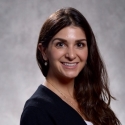Member in the Spotlight
Meet Leanna Katz
Occupational Therapist
Spaulding Rehabilitation Hospital and Shriner’s Hospital for Children – Boston
Adjunct faculty, Boston University
Please tell us about your professional background.
I received a Bachelor of Science in Brain, Behavior, and Cognitive Science from the University of Michigan in 2010. After completing my undergraduate degree, I worked as a high school math and science teacher in a remote village in Ghana and was exposed to the field of occupational therapy by happenstance. I matriculated in the Master of Science of Occupational Therapy program at Boston University (BU) and later received a Doctor of Occupational Therapy from BU.
I have worked in a range of healthcare settings including acute rehabilitation (Spaulding Rehabilitation Hospital [SRH]), acute care (Massachusetts General Hospital and Shriner’s Hospital for Children – Boston), and homecare. In 2019, I pursued teaching and joined the adjunct faculty at BU. In addition to teaching entry-level doctorate students at BU, I currently work as a per diem therapist at both SRH and Shriner’s Hospital for Children – Boston and see clients privately in the home-setting.
What inspired you to work with the stroke population?
My first clinical position was in an acute rehabilitation setting working with individuals with acquired brain injuries. I most enjoyed collaborating with patients and their families on identifying meaningful goals and then selecting the most effective evidence-based treatments to then achieve those goals. I also always enjoyed working with an interdisciplinary team that ensured optimal care and patient outcomes.
What interested you in the ACRM Stroke ISIG?
I was introduced to ACRM early in my OT career by colleagues and friends. I attended the Stroke ISIG Annual Business Meeting at my first in-person ACRM conference a few years ago. I was intrigued by the diverse representation of disciplines, practice settings and practice locations. I always strive to maximize a multidisciplinary approach in the workplace, so was very interested in getting involved, networking, and learning about the various opportunities the Stroke ISIG had to offer.
Since day one, I was most excited to collaborate, learn from, and work with colleagues from all over the world on various projects and presentations. Since becoming a member of the ACRM Stroke ISIG (and the Stroke Health and Wellness Task Force), I have worked on numerous presentations and manuscripts with other group members focusing primarily on quality of life and self-management and look forward to continuing this work in the future.
What advice would you give to an early career healthcare professional who wants to be more involved in ACRM?
First, I would encourage them to attend an ACRM conference. Attend the community group meetings and networking events and seek out opportunities to collaborate with colleagues from different disciplines, institutions, and states/countries.
Outside of professional activities, what hobbies do you enjoy?
I enjoy playing tennis, reading, and road cycling. On most summer weekends when I am not working, I can be found exploring New England by bike with my husband.
What professional achievement are you most proud of over the past year?
This past year has been a difficult one, to say the least. In my first year of teaching, I welcomed the challenge of transitioning to a 100% virtual context for a hands-on skills-based course that I taught at BU at the onset of the pandemic. It forced me to adapt, think on my feet, and use my network to ensure I provided the most meaningful experience for my students. It reminded me of what I do every day as a clinician and how proud I am of being an occupational therapist.
Is there anything else you’d like to share with the Stroke ISIG?
I find the work, projects, and presentations in academia and research that come out of this group incredibly inspiring and motivating. Many group members have served as role models and mentors for me the last few years and I look forward to paying it forward to other early career members someday.









